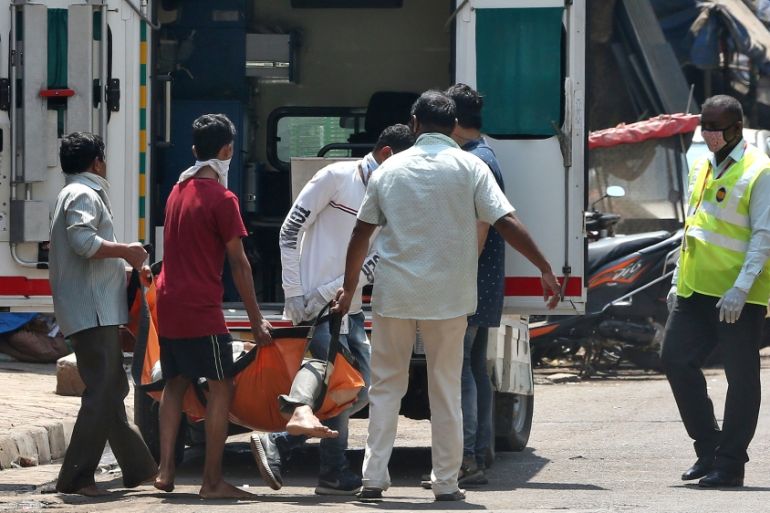‘Lost my mother not to coronavirus but to negligence of officers’
Afsari Bano, 55, quarantined with her family in Mumbai, died after she was not given medicine for high blood pressure.

Mumbai, India – When a team of medical officers quarantined Sohrab Farooqui and his family on the morning of April 11, there were a total of nine members. Four days later, when they returned home on Wednesday evening, there were eight.
Farooqui, a 25-year-old hotel management student in Mumbai, is a resident of Dharavi, one of Asia’s biggest slums. People live cheek by jowl in Dharavi, making the neighbourhood fertile ground for the virus to spread.
Keep reading
list of 2 itemsIndia extends world’s biggest coronavirus lockdown till May 3
The slum has reported 60 coronavirus positive cases and eight deaths so far. One of those tested positive was a neighbour who lived opposite Farooqui. He had been hospitalised a few days back.
On the night of April 10, a team of medical officers paid Farooqui’s neighbour a visit. “Before they left, they told us we would also be taken for a test to see if we are infected as well,” Farooqui told Al Jazeera.
Next day, early in the morning, Farooqui, his parents, his elder brother and his wife, their two kids, and his two nephews were taken to a sports complex-turned-quarantine facility about a kilometre (0.6 mile) from his home.
“The quarantine ward was basically one big hall where 31 of us were locked up,” he said. “There were only two toilets – one for men and one for women. And they were unhygienic.”
Farooqui asked an official how long they would have to stay for.
“But he had no clue,” he said. “We were told that our tests would be conducted when the medical team is available. I was worried about my parents.”
|
|
Dead on arrival
Farooqui’s mother, Afsari Bano, 55, suffered from diabetes, thyroid and blood pressure. He said his father Ansar Ahmed, 64, was also vulnerable to the infection given his age.
“Because we did not know how long we would be staying in the quarantine ward, I had not carried enough medicines for my mother,” he said.
“But I had her file. After they provided us breakfast on the morning of April 11, I told them the name of the medicine that I needed.”
But he did not get the medicine. “They said it was not available in the store,” Farooqui told Al Jazeera.
“The next day was a Sunday. We were told the store is closed. On Monday [April 13], a doctor came to inspect us, who assured me we would get the medicine the following day.”
However, Afsari’s blood pressure had shot up by then. She had been feeling unwell and found it difficult even to walk.
“I requested for a wheelchair,” said Farooqui. “They gave me one for two minutes and asked me to speak into the camera stating that I had received the wheelchair but medicines are yet to be delivered.
I was told that the video would be forwarded to higher authorities. They took the wheelchair back after we shot the video and said I will get a new one in half an hour. That did not happen.”
Meanwhile, Afsari had to go to the washroom. She walked there slowly but collapsed as she was getting out.
“She began sweating and a white liquid started coming out of her nose,” said Farooqui. “I shouted for an ambulance but the doctors at the ward could not arrange for it. We eventually got her into a cab to go to the hospital.”
The hospital was about three kilometres (1.8 miles) from the quarantine centre and just a five-minute drive away as the streets were deserted due to India’s lockdown.
But they were too late.
Afsari was pronounced dead on arrival. “I lost my mother, not to COVID-19, but to the negligence of police and medical officers,” he wrote in a Twitter post.
Virendra Mohite, the health officer in charge of the area told Al Jazeera they were looking into the matter. “It is a serious issue and we are finding out the lacuna,” he said.
After the hospital released Afsari’s body, Farooqui, accompanied by his family and friends, buried her in a local graveyard.
“We had sought permission for the funeral,” he said. “After we had concluded the funeral, the police did not let us inside their car.
One of our relatives had a motorbike. He took us back to the quarantine ward one by one. We were treated as if we were patients of coronavirus even though our results had not come out.”
The family was eventually tested for the coronavirus on Wednesday after Farooqui took to social media to publicise the circumstances surrounding his mother’s death.
The family returned home on Wednesday evening. They are now awaiting their results.